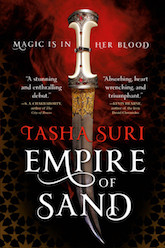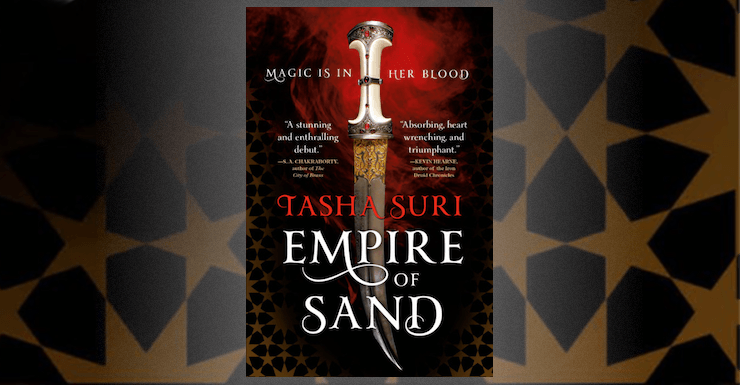I’m not in love with Orbit Books’ whole list, but in recent years, they’re one publisher with a consistent and happy knack of publishing female authors whose works go straight to my happy place. Especially debut authors. Now Tasha Suri can join a roll-call that includes Ann Leckie, K.B. Wagers, and Melissa Caruso: debut authors that made me stop in my tracks and say: Yes. This. Give me MORE.
I’ve spent a week trying to figure out how to write this review, how to tell you exactly what I enjoyed about it, and why. That’s always an issue with books I find speak to me on an emotional level while also being technically adept: to be honest about what one loves is to expose a vulnerability, to lay bare something more often kept quiet.
Empire of Sand is an astonishingly accomplished debut, set in a richly realised world. It’s a novel about power and about colonialism. It’s a novel about unequal power relationships, and about the abuse of power. It’s a novel about trust and its lack, about choices and compromises. And at its heart, it’s a novel about compassion: about the risks, and the rewards, of choosing to be kind.
Mehr is caught between two cultures. Her mother’s people are Amrithi, outcast desert nomads who swear no vows and make no contracts—including marriages. But her father is an Ambhan, a powerful nobleman from the empire that controls most of the known world. Her father is the emperor’s governor in Irinah, and as his illegitimate daughter, Mehr has been raised in careful privilege, albeit a precarious one. With her mother gone back to her people years since, Mehr has struggled to keep a connection to her mother’s people’s customs, but her determination, and the assistance of Lalita—an Amrithi woman who doesn’t claim her heritage in public, and once Mehr’s mother’s friend—means that she’s maintained a connection and knowledge of Amrithi rites.
The Amrithi rites placate, or communicate with, daiva, the djinn-like spirits who live in the Irinah desert. Amrithi rites also honour the Amrithi gods during the phenomenon known dreamfire, when—it’s said—the sleeping gods’ dreams enter the human world.
When Mehr is discovered having been out in the dreamfire, she comes to the attention of the empire’s mystics—feared servants of the immortal Maha, who founded the empire. The mystics force her into service through an arranged marriage with a young Amrithi man called Amun who’s bound to the Maha, vowed to obedience, knowing that they can’t force any other way because of her status and knowing, too, that the marriage will bind her as tightly as Amun is bound.
Amun doesn’t enjoy his service. He doesn’t want to force Mehr to service, the way he was forced. His unwillingness to consummate the marriage opens a small space for Mehr to manoeuvre against the chains that bind them both: a space that she clings to when she discovers what sort of man the Maha is, and what he will require of her. Because the Maha’s power comes from a perversion of Amrithi rites: rituals designed to compel, rather than honour, the gods. And he intends to use Mehr as mercilessly as he’s used Amun. Eventually, the small measure of breathing room that Amun has allowed her will be discovered, and they’ll both pay the price. But Mehr will hold on to hope—will fight for it, in every way she can—for as long as she can.
Buy the Book


Empire of Sand
I really liked the way in which Empire of Sand provides Mehr with multiple connections to other women, with both positive and negative emotional weight. Mehr has a much-younger sister whom she loves and wishes to protect, and a protective mother-figure and teacher in Lalita; her feelings towards her mother are complicated, and her antagonistic relationship with her stepmother is one built on the bones of her father’s choices.
In the Maha’s temple, Mehr reaches out for connections too, both with women and with men, using her status as an Ambhan noblewoman, even an illegitimate one, to play on their sympathies and work at the limits of her freedom. She builds connections and uses what people think of her (and their cultural assumptions and senses of shame, honour, and propriety) to make room to manoeuvre. Suri’s character work in this novel is top-notch, a reward and a delight to read. The connection that Mehr and Amun forge out of the most inhospitable of circumstances, based on mutual compassion, is a very believable relationship—and one that earns its conclusion twice over.
Deftly written, compelling, and brilliantly full of heart, Empire of Sand is a very promising opening to Tasha Suri’s career. I’m really looking forward to what she does next.
Empire of Sand is available from Orbit.
Liz Bourke is a cranky queer person who reads books. She holds a Ph.D in Classics from Trinity College, Dublin. Her first book, Sleeping With Monsters, a collection of reviews and criticism, was published in 2017 by Aqueduct Press. It was a finalist for the 2018 Locus Awards and was nominated for a 2018 Hugo Award in Best Related Work. Find her at her blog, where she’s been known to talk about even more books thanks to her Patreon supporters. Or find her at her Twitter. She supports the work of the Irish Refugee Council, the Transgender Equality Network Ireland, and the Abortion Rights Campaign.










